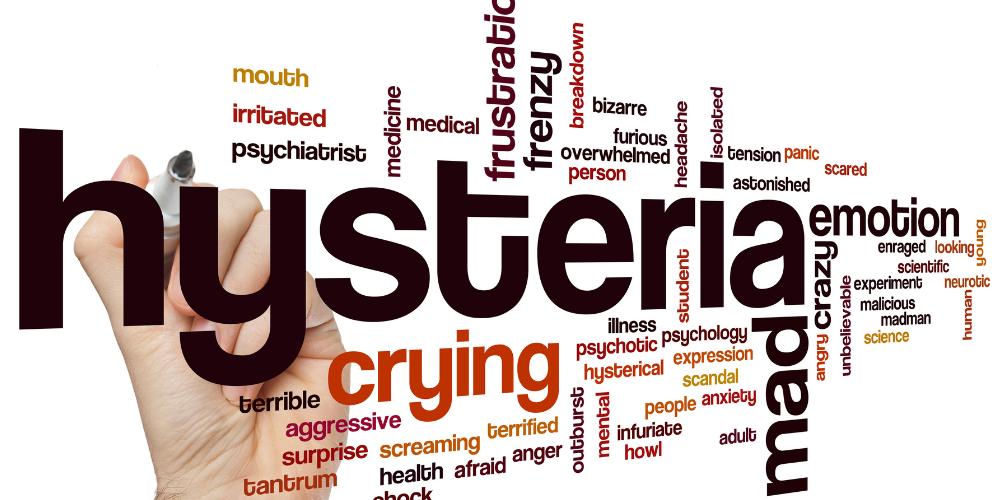Unraveling Hysteria: Understanding and Managing Emotional Outbursts!
Have you ever experienced a moment in your life when your emotions spiraled out of control, leaving you feeling overwhelmed and powerless? Have you witnessed a loved one seemingly lose control, succumbing to uncontrollable fits of anger, laughter, or tears for no apparent reason? Such experiences are often associated with the term “hysteria.”
Understanding Hysteria: Hysteria, or experiencing hysterical episodes, refers to the manifestation of exaggerated or uncontrollable emotions or behaviors. These episodes can be triggered by various factors, such as heightened fear, feelings of being lied to, or even specific physical conditions. While the term “hysteria” may seem outdated, it has a long history and has evolved over time.
Historical Perspective: The concept of hysteria dates back to ancient Egypt, with the Kahun Papyrus from 1900 BC mentioning spontaneous uterus movement as the cause. In ancient times, hysteria was linked to a lack of normal sexual life in females. Over the centuries, different theories emerged, including Thomas Willis’ 17th-century association with the brain and nervous system.
Sigmund Freud, often regarded as the father of psychoanalysis, contributed significantly to the psychological understanding of hysteria. In his 1889 work, “Studies on Hysteria” (co-authored with Joseph Breuer), Freud explored cases like that of young Katherina, shedding light on the influence of childhood sexual fantasies and the workings of the unconscious mind.
Common Triggers: Hysterical episodes can be triggered by a range of factors, including:
- Smell: Heightened sensitivity to pheromones, leading to suspicions of infidelity in a relationship.
- Emotions: Fear, feelings of deception, or low self-esteem can provoke hysterical reactions.
- Physical Factors: Conditions such as misshaped uteruses, IUDs, or post-partum states can contribute.
- Hunger: Nutritional imbalances can exacerbate emotional shifts.
- Substance Abuse: Drugs and alcohol can intensify emotions and contribute to anger and irritability.
Managing Hysteria: While understanding the triggers is essential, managing hysteria is equally important:
- Avoid Substance Abuse: Refrain from drug or alcohol use, as these substances can exacerbate emotional shifts and reactions.
- Chiropractic Care: Consider chiropractic adjustments to ensure that your spine is not pinching nerves, which can affect emotional well-being.
- Healthy Sexual Activity: Engaging in sexual activity and experiencing orgasms can help alleviate symptoms of hysteria.
- Avoid Pheromone Fragrances: Be cautious with fragrances that contain pheromones, as these may exacerbate emotional sensitivities.
- Aromatherapy: Explore aromatherapy with essential oils like Melissa (lemon balm) to promote relaxation and emotional balance.
- Stress Relief: Prioritize self-care activities such as hot baths, massages, reflexology, meditation, exercise, and counseling to manage stress and emotional triggers effectively.
- Counseling: Seek counseling to identify specific triggers and develop coping strategies. Fear is often a significant trigger for hysterical outbursts, and understanding its source can be crucial.
One important aspect to understand about hysteria is that it can manifest differently in individuals and may not always fit the classic stereotype of emotional outbursts or physical symptoms. Hysteria can present in various ways, and its symptoms can mimic those of other medical or psychological conditions, making it challenging to diagnose accurately.
For instance, hysteria can manifest as:
- Psychosomatic Symptoms: Hysterical symptoms may be physical but have no apparent medical cause. These can include unexplained pain, paralysis, blindness, or seizures. In such cases, the individual genuinely experiences these symptoms, but they are rooted in psychological distress rather than a physical ailment.
- Conversion Disorder: Conversion disorder is a condition closely related to hysteria, where psychological stress or trauma is converted into physical symptoms. These symptoms can be severe and disabling, but thorough medical evaluations often find no underlying medical explanation.
- Selective Amnesia: Hysteria can lead to selective amnesia, where individuals forget specific traumatic events or experiences as a way to cope with emotional distress.
- Fugue States: In rare cases, hysteria can result in fugue states, where individuals may temporarily lose their sense of identity, wander aimlessly, and may not remember their actions during the episode.
- Dissociative Identity Disorder (DID): While not synonymous with hysteria, DID is a complex dissociative disorder where individuals exhibit multiple distinct personalities or identities. It can sometimes be associated with trauma and may involve hysterical elements.
It’s essential to recognize that hysteria and its related conditions are not simply a matter of “faking” symptoms but are genuine psychological responses to stress, trauma, or emotional conflicts. Accurate diagnosis and treatment often require the expertise of mental health professionals who can carefully evaluate and address the underlying psychological factors contributing to these symptoms.
Moreover, the understanding and treatment of hysteria have evolved significantly over time. Contemporary psychology and psychiatry have moved away from the term “hysteria” and adopted more specific diagnostic criteria and classifications, such as those found in the Diagnostic and Statistical Manual of Mental Disorders (DSM-5). This change reflects a deeper understanding of the complex interplay between psychological and physiological factors in these conditions.
In conclusion, while hysteria may seem like a relic of the past, its impact on individuals’ emotional well-being is very real. Understanding its triggers and seeking appropriate treatments can empower individuals to manage their emotions and lead happier, more balanced lives. Remember, you’re not alone in facing these challenges, and there are effective strategies to help you regain control.

